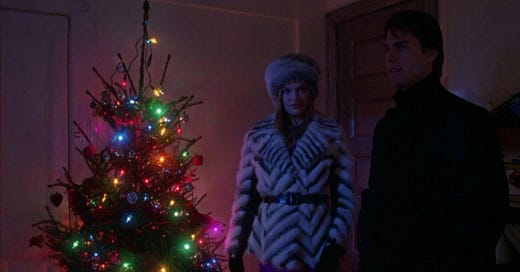Straight Panic: Twelve Days of an 'Eyes Wide Shut' Christmas
You better watch out. You better not cry.
It’s not only because the most annoying people in the world have had their fun with Die Hard that Eyes Wide Shut is next to get touted as a Christmas movie. Neither has the film finagled its way into that category by just happening to be set at Christmas, set-decorated with tinsel. Eyes Wide Shut is a Christmas ghost story by way of the spirits of the unconscious. And like Charles Dickens’s most famous one it has an old-fashioned warning to make.
Ever since Eyes Wide Shut came out in September 1999 its reception has been, for better or worse, coloured by Stanley Kubrick’s death six months earlier. To its admirers the film is a fitting swansong; to those not impressed the question remains open whether perfectionist Kubrick could’ve pulled off the film better had he lived long enough to give it his finishing touch. Not least by making the film less uneven and episodic, a common criticism back then and now.
It’s always been wrong. Throughout his career Kubrick fitted together the parts of his films via pairings: parallels, contrasts, inversions. The reason Full Metal Jacket comes in distinct halves isn’t so we all prefer the first to the second but so they jar and harmonise with each other (I think it was trying to suggest something about the duality of man, sir—the Jungian thing); meanwhile the whole of 2001: A Space Odyssey is a mirror that folds on the hinge of that famous match cut from bone-club to space nuke.
As for Eyes Wide Shut, it’s not, or not only, episodic. Kubrick paired each episode with another - locations visited twice, characters met twice or doubling for each other - and so established a pattern of point and counterpoint: horny expectation then sordid reality, the inflamed night before then the cold light of day, dreams then waking—apt for a film based on Arthur Schnitzler’s Traumnovelle or ‘Dream Story’. This pattern binds and defines the film. It’s what Kubrick needed to best dramatise his story: the quest of Bill Harford (Tom Cruise) to avenge the fantasy infidelity of his wife Alice (Nicole Kidman) with some of the real kind, and what that quest might cost…
On the first day of Christmas my true love gave to me, flirtation at Ziegler’s party
The first pairing comes when Bill and Alice attend a glitzy Christmas party hosted by Ilona and Victor Ziegler (Sydney Pollack). While Bill catches up with a friend from med school who’s playing piano for the party, Alice is chatted up by a handsome fiftyish man called Sandor.1 With his tux, Old World accent and Sam Eagle eyebrows Sandor seems to have wandered into the film from a Ferrero Rocher ad, yet Alice is not un-intrigued. She dances with him but then spots her husband across the ballroom with a beautiful young woman on each arm.
Called Nuala Windsor and Gayle, they’re fashion models, the latter of whom Bill had once been a Good Samaritan towards, albeit intimately: removing grit from her eye (a romantic device that traces its lineage back through Brief Encounter to Anna Karenina, both stories about infidelity). The models flirt hard - by the end they’re practically frottaging Bill - and he does flirt back, though in a grin-faced way, as if he’s half his age. At the same time Alice’s tipsy flirt with Sandor has the cloying girlishness of Eartha Kitt singing ‘Santa Baby’. Our married couple are babes in the woods here.
Covetous Sandor encourages Alice’s jealousy: “Don’t you think one of the charms of marriage is that it makes deception a necessity for both parties?” Since she’d told him she managed an art gallery, he propositions her by inviting her upstairs to see the Zieglers’ sculptures.
She turns him down, at first with a hedging “Not just now” then with a firmer “It’s impossible”—this explained by pointing out her wedding ring. As for Bill, his squiring of the fashion models becomes them escorting him: he asks where to, and Nuala replies, “To where the rainbow ends.” Before we find any pot of gold, and before we’re sure Bill firmly declined a proposition like his wife, a hench security guard intervenes and escorts Bill away to see their host.
Join him next time in the bathroom for a cheeky line or two more of this series, a bit of blue for the dads, a pair of bookend confessions, and the most awkward-to-amazing scene in cinema history.
You can find the next eleven days of an Eyes Wide Shut Christmas in the header above or by clicking here, or read them in order by clicking the ‘Next’ button below each post. For my last Christmas series go over to Medium. And to get more posts like this, then:
‘Sandor Szavost’ in the shooting script but ‘Sandor Szabó’ in the original script, the latter perhaps after Magda Szabó, the great Hungarian novelist of dark secrets. (Incidentally, Sandor is Hungarian for Alexander, who’s at the party of a man called Victor—read into that what you will.)






